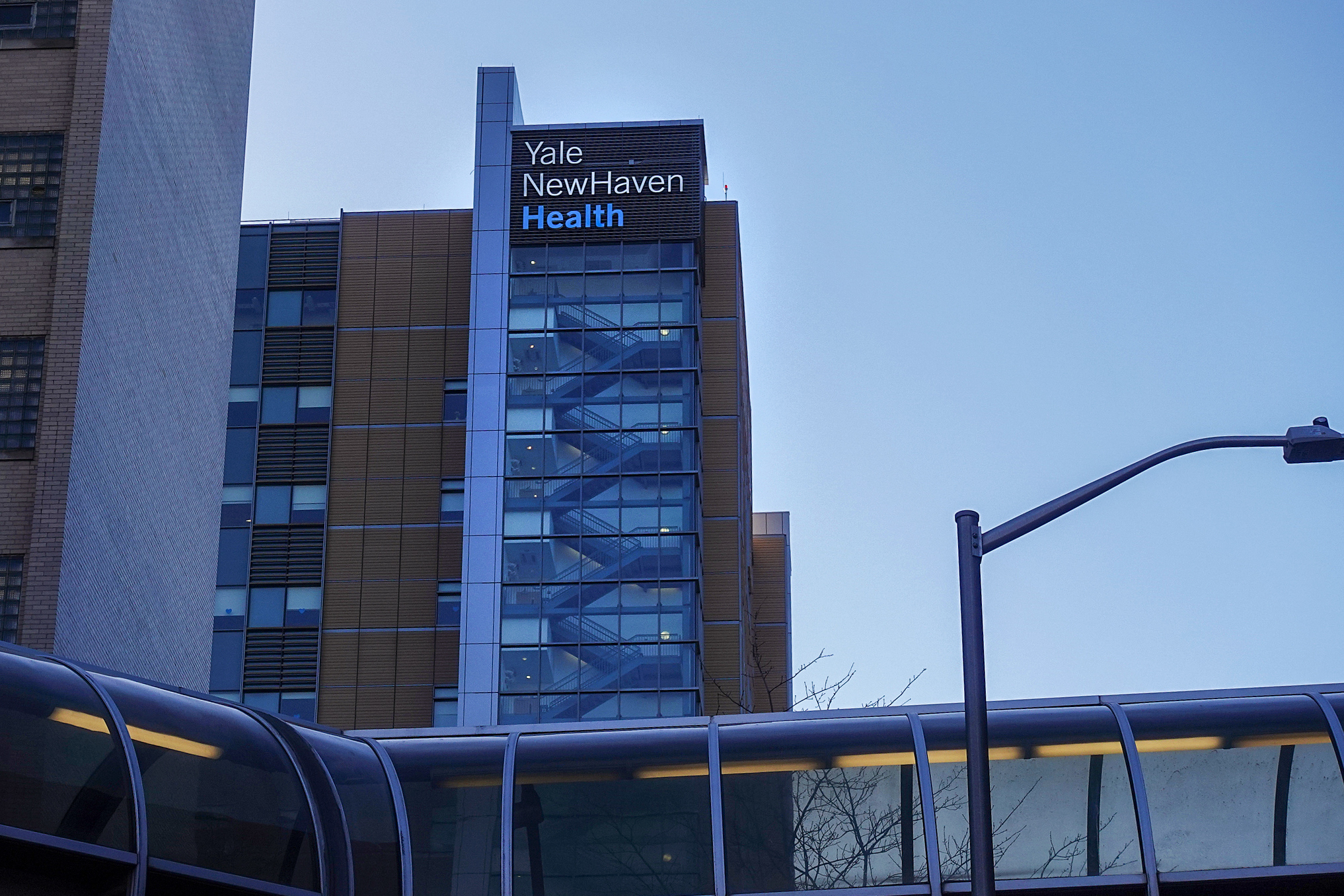Hormone-based gender-affirming care for patients under 19 discontinued at YNHH
Yale New Haven Hospital will no longer provide gender-affirming medication treatments for patients under 19, after “monitoring” federal executive orders.

Tim Tai
Yale New Haven Hospital has discontinued hormone-based gender-affirming care for patients under 19, hospital officials wrote in a letter to patients and their families this week.
In the letter, dated July 23, hospital leadership wrote that the change followed a “thorough assessment of the current environment,” citing federal policies and legal uncertainty as the driving factors. The decision, announced jointly by Dr. Clifford Bogue, chair of pediatrics, and Beth Heinz, senior vice president for women’s and children’s services at Yale New Haven Health, came after “monitoring federal executive orders and administrative actions” related to gender-affirming care for patients under the age 19.
According to the letter, which the News obtained, the pediatric gender program will continue to offer counseling, mental health services and care coordination, but Yale New Haven Hospital, or YNHH, will no longer provide patients under 19 with medications such as puberty blockers and hormone therapy.
“After careful consideration of the current federal landscape as it relates to gender-affirming care for minors, including the federal executive orders, administrative actions, recent Supreme Court cases, as well as our responsibility to ensure support for the care of all our patients — Yale Medicine and YNHH made the difficult decision to stop providing gender-affirming medication treatment for patients under 19,” Yale spokesperson Karen Peart wrote to the News.
Yale Medicine is the “clinical practice” of Yale’s medical school.
The letter heralding the end of the gender-affirming medicine program came less than a day after Connecticut Children’s Medical Center confirmed it would be closing its gender-affirming care program for patients under 19.
Melissa Combs, the mother of a 16-year-old receiving hormone therapy through Yale Medicine’s pediatric gender program, said the care her son received there was essential to his development and stability. She described the process of accessing treatment as lengthy and rigorous, involving months of evaluation by multiple medical professionals before any prescriptions were issued.
Gender-affirming care can treat children exploring or struggling with their gender identity through mental health support, social transition support and medical treatment such as puberty blockers or hormones. Yale’s pediatric gender program previously provided care from pediatric-trained endocrinologists, psychologists and psychiatrists, and offered pharmaceutical treatments for gender dysphoria when clinically indicated, according to Peart. The spokesperson added that the program did not offer surgical intervention options.
In May, the Centers for Medicare and Medicaid Services, or CMS, sent a letter to hospitals across the country warning that gender transition procedures for minors, such as hormone therapy, may violate federal quality standards and could prompt financial scrutiny. The letter called for institutions to submit documentation within 30 days detailing informed consent practices, clinical protocols and revenue tied to pediatric gender-affirming care.
According to Peart, the Yale spokesperson, Yale University convened a task force “over the past several months” composed of representatives from pediatrics, psychiatry, legal counsel and other members of leadership to evaluate the program. The spokesperson said this review was conducted “in a serious, thoughtful and multidisciplinary way.”
The spokesperson added that clinicians will work with each affected patient to develop individualized care plans. Mental health support will continue for both existing and new pediatric patients with gender identity-related concerns.
“Yale Medicine and Yale New Haven Hospital leaders spoke directly to affected clinicians and staff and continue to offer resources and support as needed while navigating this evolving landscape,” Peart wrote.
Dr. Meredithe McNamara, a pediatrician at Yale School of Medicine and researcher on transgender youth health, criticized the program’s change as politically driven.
McNamara warned that the policy shift could create abrupt disruptions for families and youth in active treatment. She added that Yale clinicians were not behind the decision and now left to manage consequences.
“No clinician thinks that revoking care is okay, but this administration’s policies have forcibly removed clinicians and parents from medical decision making,” McNamara wrote in an email to the News, referring to the Trump administration. “It’s every provider’s job to signal unwavering love and respect for gender diverse youth and their families.”
In an article published on Friday on the White House website, the Trump administration praised YNHH and Connecticut Children’s Medical Center for discontinuing hormone-based gender-affirming care for minors, framing the move as part of a broader federal effort to eliminate what it calls “child sexual mutilation.” The post, titled, “President Trump Promised to End Child Sexual Mutilation — and He Delivered,” directly credits Yale’s decision to the administration’s executive order.
“This article is fearmongering and sends out a lot of wrong messaging to teens and families who are unclear with the actual situation,” Wisteria Deng, a clinical psychology PhD candidate at Yale and clinical fellow at YNHH who works with the gender program, said about the White House article.
Deng also emphasized that the Yale pediatric gender program was still open, seeing patients and offering other services, contrary to the White House post’s portrayal.
Combs, an advocate for the LGBTQ+ community and executive director of the Out Accountability Project, called for resistance to federal directives targeting healthcare for transgender youth and urged continued scrutiny of politically influenced healthcare decisions.
“I want to send a message to trans youth and let them know that they are not alone,” Combs said in a phone call with the News. “I want them to know they are deserving of dignity, respect and life affirming medical care even in states of pressure from institutions and political leadership.”
The Yale New Haven Pediatric Speciality Clinic is located at 1 Long Wharf Drive.







